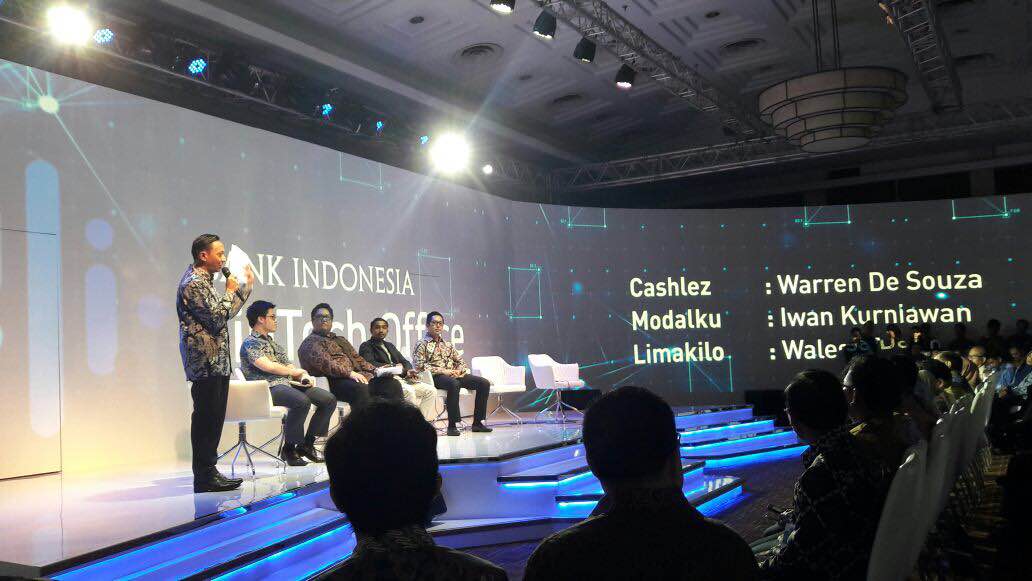Embracing fintech, Bank Indonesia opens BI Fintech Office: Page 2 of 2
By Masyitha Baziad November 22, 2016
Non-cash transactions on the rise

BI’s head of payment system policy and department monitoring Eni Panggabean told the press that while Indonesia is well known as a large cash-based society, the usage of non-cash channels is increasing steadily.
Up until August 2016, transactions through automated teller machine (ATMs) and debit cards hit 5.4 million transactions per day with a value of Rp9.2 trillion (US$685.3 million) per day, while credit card transactions reached 823,000 transactions per day with a value of Rp743 billion (US$55.4 million) per day and e-money transactions reached 1.9 million transactions per day with a value of Rp20 billion (US$1.5 million) per day.
“We can see that e-money transactions are more popular than credit card transactions and this means that technology has reached some of Indonesia’s unbanked population, and this is what we want to see more of,” Eni said.
Eni said that currently only 36% of Indonesians have access to banks and formal financial institutions.
BI’s data also showed that despite Indonesia’s growing middle class and the huge need for alternative financing solutions, the formal financial sector can only serve 35% of the country’s gross domestic product (GDP).
“The rest of the GDP are still catered for by the non-formal financial sector, the micro-financiers and cooperatives,” she added.
“The presence of fintech is expected to close this financial gap while at the same time increasing efficiency and productivity of the financial system. Therefore it needs to be monitored to keep the stability of the financial and payment system,” she concluded.
The much-needed move
As the pioneer of peer-to-peer lending in Indonesia, Modalku works closely with OJK as well as BI. With US$12 million loaned through their platform in the past year, Modalku sees the move by Indonesian regulators as a positive sign.
“The BI fintech office is meant to support the industry. Our regulators are increasingly understanding the value and imperative of balancing innovation and prudence in regulating the fintech sector. This will generally be a supportive measure,” its chief operating officer (COO) Iwan Kurniawan told Digital News Asia (DNA).
He highlighted the fact that regulators are working closely with players to develop the regulations, and that gives a good sign of the regulators embracing the nascent fintech sector.
“Regulation will result in better protection of users of fintech services, in our case, both investors and borrowers, wider education of the value of fintech in developing the market, and facilitation of more collaboration between banks, non-banks and fintech companies,” he said.
Concurring with Iwan is Aidil Zulkifli, chief executive officer of the country’s first online direct lending platform UangTeman, saying that there is strong regulatory interest in the industry and that is essential for the fintech sector’s development.
“I strongly believe that fintech in general should operate within a defined regulatory framework in order to protect consumers, and for mitigation against any systemic risk that a fintech company or the industry can pose to the general economy,” he told DNA.
However, as UangTeman will not be regulated by BI, but OJK, Aidil raised his concerns on whether having two fintech offices by BI and OJK will in the end confuse many players and send a competition signal between the two regulatory bodies.
In Indonesia, BI is responsible for overseeing and regulating all payments and transactions that happen throughout the country, while its counterpart, OJK oversees and regulates financial service providers and their products.
To put it into perspective, any fintech startup that deals with payments, e-wallets, e-money and transaction processing will fall under BI’s jurisdiction, while fintech startups that deal with lending (peer to peer, or online direct lending), blockchain or e-trading, will fall under OJK’s jurisdiction.
Answering this question, OJK’s senior research executive of the strategic policy development department Hendrikus Passagi told DNA that it should not be confusing at all.
“The point is simple; know your own business model. If your activities have payment processing and deal with transactions, you have to get a license from Bank Indonesia, and if your activities have lending, e-assessment, and investment in it, you should come to OJK, if you have both, then you have to have the license and permit from both OJK and BI,” he said.
In December this year, OJK will issue fintech regulations and a regulatory sandbox focusing on lending and investments.
Related Stories:
Fintech, from the PoV of Indonesia’s regulator
Exclusive: UangTeman’s policy paper to Indonesia’s financial regulator
Startup: Get ready to get regulated
For more technology news and the latest updates, follow us on Twitter, LinkedIn or Like us on Facebook.



